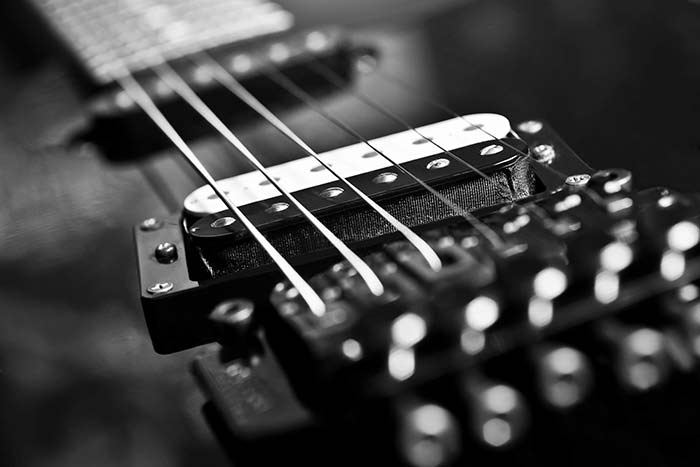As a guitarist, it’s easy to get caught up in the thrill of playing new techniques, learning complex songs, and exploring different styles.
However, it’s essential to remember that a solid foundation in the basics is crucial for any level of guitarist, regardless of whether you’re an intermediate or advanced player.
In this article, we’ll explore the importance of going back to basics and provide some practical tips on how to refocus your guitar playing.

Why go back to basics?
When you’re an intermediate or advanced guitar player, it’s tempting to skip over the basics and focus on more challenging material.
However, neglecting your fundamental skills can lead to a range of problems, including:
Poor technique
Without proper technique, you may develop bad habits that can lead to a myriad of problems that can hinder your progress and even impact your overall health and well-being.
Bad habits can lead to a range of issues, including finger pain, tendonitis, and even long-term damage to your joints and muscles.
Lack of clarity
If you’re not solid in your fundamentals, you may struggle to convey the intended emotion and expression in your playing.
Clarity is essential for effective communication through music, and without it, your playing may come across as muddy, unclear, or even confusing.
Limited creativity
Without a strong foundation in music theory and technical skills, you may find yourself stuck in a rut, unable to explore new ideas or styles.
Creativity is essential for any musician, and without it, you may find yourself repeating the same old ideas or relying on familiar formulas rather than pushing yourself to new heights.
Frustration
When you’re struggling to play complex pieces or improvisations, frustration can set in, leading to burnout and a loss of motivation. Frustration is a natural part of the learning process, but when it becomes overwhelming or chronic, it can be devastating to your progress and overall well-being.
When you’re struggling to master a particular piece or technique, it’s natural to feel frustrated or discouraged. However, by recognising that frustration is a normal part of the learning process and taking steps to address it, you can overcome obstacles and continue making progress.
Missed opportunities
Neglecting your fundamentals can lead to missed opportunities to improve your skills and take your playing to the next level.
When you’re not solid in your fundamentals, you may miss out on opportunities to learn new techniques or styles that could take your playing to new heights.

What are the basics?
Whether you’re a beginner or an experienced guitarist, a solid grasp of the basics is essential for taking your playing to the next level. Here are some key areas to focus on:
Finger independence and dexterity
Developing finger independence is crucial for guitar players, as it allows for precise and speedy playing. Without proper finger independence, complex music can be challenging and even sound clumsy.
To improve finger independence, practice exercises that stretch your fingers and help you control them individually, such as slow passages and scales.
The chromatic scale, practised very slowly, is ideal for developing control with each finger. It requires precision if you want to play it well and with a good tone and guitar technique!
Practicing right and left hands separately
One of the greatest secrets to developing your technique is to hone in specifically on your right or left hand.
As an example, by practising your picking hand alone on a particularly agile and difficult picking solo, you will develop so much more insight into what the right hand needs to achieve in order to excel at that particular passage.
To do this, you would mute the strings and work on your picking hand only (no left hand at all!). You will be drastically surprised at how quickly your speed and agility increase when doing this!
After doing this, you can work on your left alone and fret the notes (with no sound) but hear the sound in your mind’s or musical mind’s eye! The goal should be to fret with absolute precision and perfection in order to execute the notes to the absolute best of your ability!
This will give you the ability to OWN THE PIECE you are playing and not merely just get by!
Does it require more work? Yes, but you will then also be rewarded for the hard work and input you put into that particular piece of music.
You can also use this technique to get back to the basics of say playing all the pentatonic and blues scales throughout the neck. Simply practice the right picking hand separate and then the fretting hand separate and then finally together.
This will most certainly strengthen your basic knowledge and make your playing so much stronger!
Chord shapes and voicings
Chord shapes and voicings are the foundation of harmony, providing the building blocks for creating complex harmonies and progressions.
By mastering a range of chord shapes and voicings, you’ll be able to play a wide variety of styles and genres, from rock to jazz to classical music, and develop a strong foundation in harmony that enables you to play chord progressions with confidence and precision.
Scales and arpeggios
Scales and arpeggios are fundamental components of guitar playing that contribute to both technical proficiency and musical expression. Scales are sequences of notes played in ascending or descending order, forming the basis for melodies, solos, and improvisation. They help guitarists understand the relationships between notes and develop finger strength and dexterity.
Arpeggios, on the other hand, are the notes of a chord played individually rather than simultaneously. Practising arpeggios enhances a guitarist’s ability to outline chord progressions and add harmonic complexity to their playing. Mastery of scales and arpeggios provides a strong foundation for creating music, improving improvisational skills, and enabling smoother transitions across the fretboard.
Rhythm and timing
Rhythm and timing in guitar playing are essential for creating a cohesive and engaging performance. Rhythm involves the pattern of sounds and silences, while timing ensures notes are played at the precise moment.
Mastering these elements allows guitarists to maintain a steady tempo, synchronise with other musicians, and switch smoothly between rhythmic patterns. Good rhythm and timing provide a solid foundation for the music, enhancing both technical accuracy and musical expression.
Ear training and listening
As you sharpen your ear training skills, you’ll unlock the ability to recognise and replicate the intricate patterns, intervals, and harmonies that make up music.
By dedicating yourself to attentive listening and repetition, you’ll develop a heightened sense of musical awareness, allowing you to effortlessly identify chord progressions, melodies, and harmonies without the need for written notation or reference guides.
Tone production
Tone production in guitar playing involves creating a clear, resonant sound through a combination of proper technique, equipment selection, and setup. Achieving excellent tone requires precise finger placement, appropriate pick attack, and controlled strumming or plucking.
The choice of strings, picks, and the type of guitar also play crucial roles in shaping the tone. Additionally, the amplifier settings and effects used can significantly influence the final sound.
Musicality
Musicality refers to the ability to convey emotion, feeling, and expression through the instrument. It involves more than just technical proficiency; it’s about interpreting the music in a way that connects with the listener on an emotional level.
This includes dynamics (varying the volume and intensity), phrasing (the way notes and chords are played to give them shape and meaning), and articulation (how each note is attacked, sustained, and released).
A guitarist with strong musicality can make the guitar sing, adding depth and nuance to their performance. This transforms a sequence of notes into a compelling musical story, engaging the audience and creating an immersive experience.

Practical tips
To refine your basic skills as an intermediate or advanced guitar player, here are some practical tips:
- Set aside time for drills: Dedicate specific times each day or week to focus on drills and exercises that target particular areas of improvement, such as finger independence and chord shapes. Consistent practice in these areas builds muscle memory and technical proficiency.
- Practice slowly: When learning new techniques or pieces, practice at a slow tempo to emphasise accuracy and precision. Gradually increase speed as you become more comfortable, ensuring that your playing remains clean and controlled.
- Use technology: Take advantage of apps, software programs, or online tools designed to provide exercises and drills tailored to your specific needs. These resources can offer personalised practice routines and track your progress over time.
- Play with a metronome: Incorporating a metronome into your practice sessions can help you develop a strong sense of rhythm and timing. Start at a comfortable tempo and gradually increase it as your timing improves.
- Use a looper or backing track: Practising with a looper or backing track can enhance your timing and rhythm skills by simulating real playing situations. It also helps you learn to play in sync with other instruments and maintain a steady tempo.
- Listen to others: Study recordings of professional guitarists, paying close attention to their technique, tone, and overall playing style. Analysing their performances can provide insights and inspiration for your own playing.
- Practise with a purpose: Set specific goals for each practice session to ensure focused and effective practice. Whether it’s mastering a particular technique or learning a new piece, having clear objectives will help you make steady progress.
- Break it down: Divide complex pieces or techniques into smaller, manageable sections. Focus on mastering each section individually before combining them. This approach makes difficult material more approachable and less overwhelming.
- Stay patient: Remember that refining your skills takes time and patience. Progress may not be immediate, but consistent, focused practice will yield results over time. Stay positive and persistent, and avoid getting discouraged by temporary setbacks.

Additional tips for intermediate and advanced guitarists
As an intermediate or advanced guitarist, you may be tempted to skip over the basics in favour of more complex material.
However, neglecting your fundamentals can lead to stagnation and limited creativity. Here are some additional tips:
- Explore different styles: Explore different styles of music to expand your musical knowledge and improve your technical skills.
- Experiment with new techniques: Experiment with new techniques such as tapping, legato playing, or sweep picking to add variety to your playing.
- Work on sight-reading: Improve your sight-reading skills by working on reading sheet music or tabs without prior practise.
- Develop your own style: Develop your own unique style by incorporating elements from different styles into your playing.
Conclusion
Going back to basics is an essential part of any guitar player’s journey, regardless of level or experience.
By focusing on refining your fundamental skills, you’ll develop a strong foundation that will enable you to tackle more complex material with confidence and precision.
Remember that practice is key, so be patient and persistent as you work on refining your skills. With dedication and persistence, you’ll be well on your way to becoming a masterful guitarist.
By following these tips and focusing on refining your fundamentals as an intermediate or advanced guitar player, you’ll be able to take your playing to the next level and achieve greater success as a musician!







